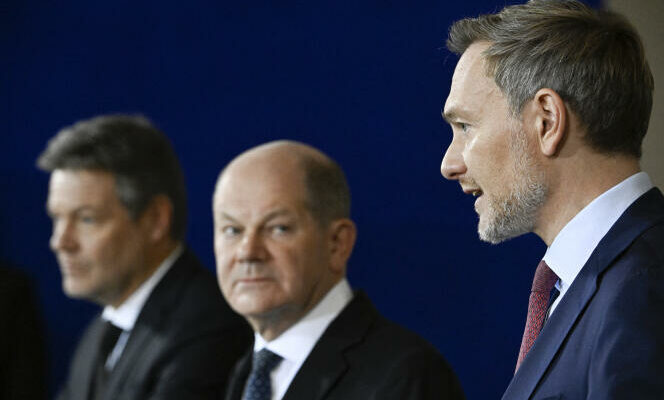In Berlin, the dispute over budgetary rules took an unexpected turn. The German Finance Minister, Christian Lindner, leader of the Liberal Democratic Party and supporter of a strict limitation of public spending, announced, Saturday December 16, his intention to present at the beginning of 2024 a reform of the constitutional mechanism of the “brake to debt”, which limits the annual structural deficit of the federal State to 0.35%. The tool is a major subject of division within the government coalition in Berlin.
Concretely, this would involve loosening the conditions for calculating the deficit authorized for the federal State. This calculation, which includes a cyclical component, could be reformed to allow greater budgetary room for maneuver in the event of an economic recession. The idea has long been supported by an economic think tank close to the Social Democratic Party, Dezernat Zukunft (Future Department).
“Over several years, this will not increase the possible debt”, specified Mr. Lindner, explaining that a surplus deficit during periods of recession could be recovered during phases of economic recovery. The proposal has another advantage: unlike a real reform of the system with constitutional rank, this marginal modification would be possible thanks to a simple majority in the Bundestag. There is no need to obtain the support of the Christian Democratic opposition, which has made the subject its main battleground against the government of Olaf Scholz.
This surprising initiative on the part of the minister most attached to the principle of the debt brake can be explained by the intensification of the political debate on this subject in recent days. Since the ruling of the German Constitutional Court on November 15, which censored an off-budget fund of 60 billion euros, plunging the government into a serious budgetary crisis, criticism has multiplied against the debt brake. For the first time, the instrument no longer commands consensus among German economists: according to a survey published on December 8 by the very orthodox Ifo institute, 50% of the 187 experts questioned are now in favor of adapting or completely abolishing the system, accused of being too inflexible and of restricting investment. Only 48% want it to remain as it is.
Threat of social discontent
Within the population, on the other hand, the debt brake continues to be widely supported. But the situation could change. The government has, in fact, adopted a series of measures to reduce public spending to complete its 2024 budget, which could have significant economic and social consequences: the elimination of certain so-called subsidies “harmful to the climate” will increase the price of diesel for farmers, and therefore probably increase food prices. The increase in the carbon tax should increase the prices of gasoline at the pump, fuel oil and heating gas. And the end of the subsidy for electric vehicles on Monday, December 18 could hurt sales in the German automobile industry, which is already struggling to make its transition.
You have 25% of this article left to read. The rest is reserved for subscribers.
